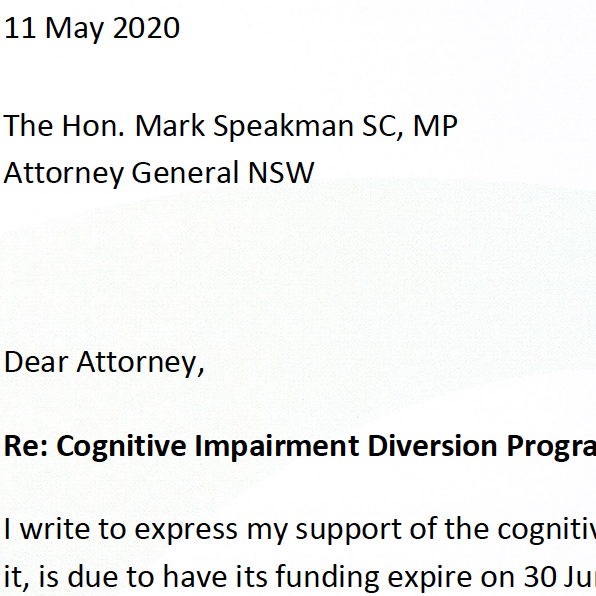 Cognitive Impairment Diversion Program (CIDP) funding to be discontinued
Cognitive Impairment Diversion Program (CIDP) funding to be discontinued
11 May 2020
The Hon. Mark Speakman SC, MP
Attorney General NSW
By email
Dear Attorney,
Re: Cognitive Impairment Diversion Program
I write to express my support of the cognitive impairment diversion program (CIDP) which, as I understand it, is due to have its funding expire on 30 June 2020.
As a director of a law firm that has represented a vast number of clients in the criminal justice system who have intellectual and cognitive disabilities, I have seen first-hand the value of the CIDP program.
The very sad state of affairs connected with the dreadful over representation of people with mental illness and intellectual disabilities within the criminal justice system needs to be addressed urgently with measures that are focused on achieving long-term change. As I understood it, the current NSW government has recognised this factor and had actively prioritised measures aimed at reducing this disproportion. The decision to abandon this program is at odds with that focus.
The CIDP represents a valuable diversionary program meaning that people who I have represented have, in fact, with the assistance of the program avoided jail. Further I have seen clients who have offended with disturbing regularity reduce their level of recidivism within the period of time that CIDP has been working with them.
I have also seen the invaluable assistance that has been provided by the program’s staff who have been dedicated to the assistance of the participants; navigating them through the complex and overwhelming nature and process of the criminal justice system.
It is particularly important to have such a program working within the environment of the criminal justice system where these clients are often represented by legal aid lawyers whose work loads are enormous and where time to confer with and attend to clients is necessarily short. You will be aware of the considerable time and effort required for a lawyer dealing with a client with cognitive impairment or intellectual disability to explain legal concepts to, and then ensure that the client understands what is happening with their case.
Having programs such as the CIDP enables a stop gap so that these clients are assisted by someone who understands not only the process but also the mechanisms in place that might assist the Court in coming to an alternative arrangement for the client other than the blunt, and often brutal, application of the criminal justice system.
I commend the CIDP program for the work that it has done in recent times and encourage the government to continue to support and fund the CIDP program. There really can be no doubt that this program is not only beneficial, but if it is abandoned it will need to be reimplemented in some form or other. I encourage the government to do what it can to see that the CIDP program is not only refunded but also extended into the future.
I would be very happy to discuss this matter further should that be of any benefit.
Your faithfully,
O’BRIEN CRIMINAL AND CIVIL SOLICITORS
Peter O’Brien



